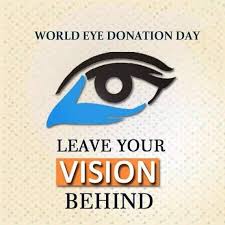The Importance of Eye Donation
Corneal blindness is a significant cause of visual impairment worldwide. It occurs when the cornea, the transparent front part of the eye, becomes damaged due to disease, injury, or infection. Unlike other forms of blindness, corneal blindness is often curable through corneal transplantation. However, the availability of healthy donor corneas is a major limiting factor in performing these sight-restoring surgeries.
Eye donation involves the voluntary act of giving one's corneas after death to those in need of a transplant. A single eye donor can provide corneas to restore sight to two individuals. Despite the life-changing impact of this gift, there remains a global shortage of donated corneas, making awareness campaigns like World Eye Donation Day crucial.

History and Significance of World Eye Donation Day
World Eye Donation Day was established to create a unified effort to address the shortfall of donor corneas and to educate the public about the transformative power of eye donation. The day is marked by events, seminars, and campaigns organized by eye banks, hospitals, non-profit organizations, and community groups worldwide. These activities highlight success stories, share information on how to become an eye donor, and encourage people to pledge their eyes.
How to Participate and Make a Difference
1. Pledge Your Eyes: One of the most impactful ways to contribute is by pledging to donate your eyes. You can register with a local eye bank or through national eye donation programs. Ensure your family is aware of your wish to donate so they can honor your pledge.
2. Spread Awareness: Use your voice and platforms to spread the word about the importance of eye donation. Share information on social media, write blog posts, or participate in local events. The more people know about the need for eye donations, the more likely they are to consider becoming donors.
3. Support Eye Banks and NGOs: Many organizations work tirelessly to promote eye donation and provide corneal transplants. Support these groups through donations, volunteering, or participating in their awareness campaigns.
4. Educate Yourself and Others: Learn about the process of eye donation and transplantation. Understanding the science and logistics behind it can help dispel myths and encourage informed decisions about donation.

The Impact of Eye Donation
The gift of sight is profound. For recipients, a corneal transplant can mean the difference between a life of darkness and one filled with light and opportunity. It can restore independence, improve quality of life, and enable individuals to contribute more fully to their communities.
Inspiring Stories
Consider the story of Ayesha, a young woman from India who suffered from corneal blindness due to an infection. After receiving a corneal transplant from a donor, Ayesha regained her sight and went on to pursue her dream of becoming a teacher. Her story is a testament to the life-changing power of eye donation.
Conclusion
World Eye Donation Day on June 10, 2024, is more than just a
date on the calendar; it's a call to action. It's a reminder that each of us
has the potential to make a monumental difference in someone else's life
through the simple act of pledging our eyes. As we celebrate this day, let’s
commit to spreading awareness, supporting eye donation initiatives, and
fostering a world where no one suffers from preventable blindness. Your pledge
today can illuminate the path to a brighter tomorrow for someone in need.

